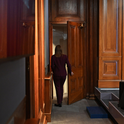Last night saw the last of this election's televised debates—a five-way battle between the leaders of the main opposition parties. It marked the end of a variety pack of different sized battles, from the first interview (or "not debate") which saw Ed Miliband and David Cameron grilled by a relentless Jeremy Paxman, to a chaotic seven way showdown (or as Twitter would have it, a #massdebate), plus two shouty Scottish battles.
Setting up the debates was a fiercer contest than any of the debates themselves. Weeks of frenzied negotiations between the broadcasters, Cameron (who didn't want to do any), Miliband (who wanted to debate Cameron) and Nick Clegg (whose desires were largely irrelevant to the other leaders) produced this hybrid format. But was it worth it? Should we just forget it next time? Or are there positives to be drawn?
David Axelrod says US Presidential Campaigns are an “MRI scan” of leaders’ souls. The same is true of general elections and particularly leaders’ debates. They are as much about character as policy, revealing the dynamic between the leaders as well as the qualities of each. At the last election, Nick Clegg was the surprise beneficiary, this time Ed Miliband prompted a reassessment of his leadership. David Cameron looked churlish for refusing to turn up to all of them. The debates are here to stay, and that’s a good thing, but next time the terms need to be sorted out, properly, in advance so that they do not become the subject of political games.
Personally I think the debates have been a bit of a disaster for our party. We spent nearly five years, carefully crafting an image of Ed Miliband as a geeky buffoon, a man who couldn't handle a bacon sandwich let alone a Russian invasion of Eastern Europe and now look at him. He's turned into a bloody internet sensation. He's Ryan Gosling for people too old to know who Ryan Gosling is. Thousands of man hours spent feeding pictures of Ed looking terrible to the papers, all gone with one smouldering sideways glance at Leanne Wood. I'll retire to Bedlam.
The big questions aren’t asked [in the TV debates] in this country; you have a whole bunch of paedophiles covered up by the Official Secrets Acts and nobody is asking why. If you can’t trust people to protect orphans, how can you trust them to run the country? Thats just one example of how prescribed the debate is. We need to open up our politics, to have more transparency and we have to have true democracy, and I don’t think these Britain's Got Talent style debates do that. I am much more excited about the idea of a debate on Britain’s future in the European Union—that will really open things up.
I think the positive was that they allowed scrutiny of all the main party leaders, in a way that did not hijack or overshadow the entire election campaign. If you compare the way the debates have been conducted in 2010 and 2015, the debates in 2015 have proved to be the lesser of two evils. They haven't been a perfect format, but the way the debates completely destabilised the last election hasn't happened this time. Certainly, though, their impact has been entirely disproportionate to the amount of time we have spent debating the debates. At the next election we really have to sit down well in advance, and in a much more mature way, nail down precisely what role the debates can have in future campaigns.
I doubt if the debate will have shifted many votes, although viewers with a low opinion of Ed Miliband may continue to be impressed by his ability to string a prepared sentence together. Actually, he was better in the unscripted sections of last night's debate. I thought he had the edge over Nicola Sturgeon in the argument. She has, after all, thrown away her bargaining power by saying that she would never do a deal with the Tories. That means she would have to support a Miliband government whatever it did, but she tried to make it sound as if she would force a Labour government to be more "progressive." It is remarkable how "progressive," adopted by Tony Blair as a euphemism for "a bit left wing," has now become the holy grail of idiot leftism, with Leanne Wood, Natalie Bennett and Sturgeon uniting to urge more of it on Miliband. That made it easy for Miliband to appear sensible, even when Nigel Farage's economics were more soundly based than his own. But did David Cameron's absence embarrass him? I don't think so: it just made this look like the B-team.
Setting up the debates was a fiercer contest than any of the debates themselves. Weeks of frenzied negotiations between the broadcasters, Cameron (who didn't want to do any), Miliband (who wanted to debate Cameron) and Nick Clegg (whose desires were largely irrelevant to the other leaders) produced this hybrid format. But was it worth it? Should we just forget it next time? Or are there positives to be drawn?
MRI scans for the soul
Rachel Sylvester—columnist for The TimesDavid Axelrod says US Presidential Campaigns are an “MRI scan” of leaders’ souls. The same is true of general elections and particularly leaders’ debates. They are as much about character as policy, revealing the dynamic between the leaders as well as the qualities of each. At the last election, Nick Clegg was the surprise beneficiary, this time Ed Miliband prompted a reassessment of his leadership. David Cameron looked churlish for refusing to turn up to all of them. The debates are here to stay, and that’s a good thing, but next time the terms need to be sorted out, properly, in advance so that they do not become the subject of political games.
A Tory disaster
@GeneralBoles—Twitter parody account of former Conservative planning minister Nick BolesPersonally I think the debates have been a bit of a disaster for our party. We spent nearly five years, carefully crafting an image of Ed Miliband as a geeky buffoon, a man who couldn't handle a bacon sandwich let alone a Russian invasion of Eastern Europe and now look at him. He's turned into a bloody internet sensation. He's Ryan Gosling for people too old to know who Ryan Gosling is. Thousands of man hours spent feeding pictures of Ed looking terrible to the papers, all gone with one smouldering sideways glance at Leanne Wood. I'll retire to Bedlam.
No big questions
Irvine Welsh—NovelistThe big questions aren’t asked [in the TV debates] in this country; you have a whole bunch of paedophiles covered up by the Official Secrets Acts and nobody is asking why. If you can’t trust people to protect orphans, how can you trust them to run the country? Thats just one example of how prescribed the debate is. We need to open up our politics, to have more transparency and we have to have true democracy, and I don’t think these Britain's Got Talent style debates do that. I am much more excited about the idea of a debate on Britain’s future in the European Union—that will really open things up.
Lesser of two evils
Dan Hodges—Telegraph writer and former Labour officialI think the positive was that they allowed scrutiny of all the main party leaders, in a way that did not hijack or overshadow the entire election campaign. If you compare the way the debates have been conducted in 2010 and 2015, the debates in 2015 have proved to be the lesser of two evils. They haven't been a perfect format, but the way the debates completely destabilised the last election hasn't happened this time. Certainly, though, their impact has been entirely disproportionate to the amount of time we have spent debating the debates. At the next election we really have to sit down well in advance, and in a much more mature way, nail down precisely what role the debates can have in future campaigns.
The B-team looked solid
John Rentoul—Columnist for the Independent on SundayI doubt if the debate will have shifted many votes, although viewers with a low opinion of Ed Miliband may continue to be impressed by his ability to string a prepared sentence together. Actually, he was better in the unscripted sections of last night's debate. I thought he had the edge over Nicola Sturgeon in the argument. She has, after all, thrown away her bargaining power by saying that she would never do a deal with the Tories. That means she would have to support a Miliband government whatever it did, but she tried to make it sound as if she would force a Labour government to be more "progressive." It is remarkable how "progressive," adopted by Tony Blair as a euphemism for "a bit left wing," has now become the holy grail of idiot leftism, with Leanne Wood, Natalie Bennett and Sturgeon uniting to urge more of it on Miliband. That made it easy for Miliband to appear sensible, even when Nigel Farage's economics were more soundly based than his own. But did David Cameron's absence embarrass him? I don't think so: it just made this look like the B-team.












